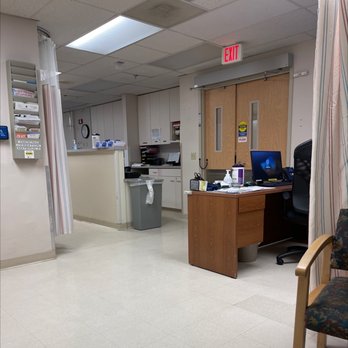Finding the Best Hospitals Near You: A Parent’s Guide to Local Healthcare Facilities
?? Hello super parents! When it comes to taking care of your little ones, we know that nothing but the best will do. That’s why finding a top-notch hospital close to home is as crucial as the love and support you shower on your children. With this in-depth guide, you’ll be able to seek out the finest healthcare facilities in no time! Let’s hold hands and embark on this journey to discovering your go-to hospital.
Understanding Your Local Hospital Options
Before diving into Google searches for “the best hospitals near me,” it’s important to understand the types of healthcare facilities available. From general hospitals to specialty clinics and children’s healthcare centers, familiarizing yourself with the different options can ensure you’re looking in the right place for your family’s needs.
What to Look For in a Hospital
Every parent’s checklist for an ideal hospital might differ slightly, but here are some common factors to consider:
- Quality of care
- Patient reviews and hospital ratings
- Location and accessibility
- Emergency service availability
- Specialized pediatric care
- Affordable options and insurance compatibility
Starting Your Search
Begin by asking friends, family, and your pediatrician for recommendations. Personal experiences often lead to the best insights. On top of that, you can consult various online platforms like Hospital Compare, Healthgrades, and Leapfrog Group for hospital ratings and quality indicators.
Navigating Through Hospital Rankings and Reviews
We live in an age where data is at our fingertips, and it applies to hospital choices as well. Websites that rate and review hospitals can be incredibly helpful. Here’s how to interpret that information:
- Hospital Compare: This site, run by Medicare, gives details on quality measures such as timely and effective care.
- Healthgrades: Healthgrades offers comprehensive information about doctors, hospitals, and healthcare providers including patient satisfaction scores.
- The Leapfrog Group: An organization that grades hospitals on safety, with easy-to-digest letter grades.
Essential Questions to Ask
Armed with information and a list of potential hospitals, it’s time to fine-tune your search by getting answers to some key questions:
- Does the hospital have a well-equipped emergency room that’s open 24/7?
- Are there pediatric specialists available?
- What is the nurse-to-patient ratio on the pediatric floor?
- How does the hospital handle parental involvement in a child’s care?
- What are the hospital’s policies regarding overnight stays with a sick child?
Remember, when it comes to your children’s health, no question is too small or insignificant. Hospitals should be transparent and provide all the necessary information willingly.
Localize Your Hospital List
Now that you’re equipped with knowledge and key questions, it’s time to localize your list. Here’s how to find the best nearby options for your specific needs:
- Compile a list of hospitals within a comfortable travel distance.
- Visit the hospital websites and take virtual tours if available.
- Read through the services and facilities specifically focused on children.
- Check for hospital affiliations with universities or research institutions, which can indicate a commitment to cutting-edge treatments and procedures.
- Look for hospitals that have partnerships with reputable pediatric organizations.
Visiting the Hospitals
Once you’ve narrowed down your options, scheduling a visit to each hospital can be a great way to get a feel for the environment and staff. Here’s what to focus on during your visit:
- The cleanliness of the facility
- The demeanor of the staff
- Overall atmosphere and whether it feels child-friendly
- The ease of navigation within the hospital
- Availability of on-site family resources or support services
When it comes to the health and well-being of your family, making informed decisions is paramount. In this guide, we’re here to ensure you have all the tools and confidence you need to find the best hospitals near you. Continue on through each step, and you’ll arrive at a place where you feel secure and supported in the event that you need medical intervention for your little one.
Stay positive and proactive, dear parents, and remember, you’re doing a fantastic job ensuring the best healthcare for your child!

Five Things Parents Should Know in Preparing for Hospital Visits
1. How to Prepare Your Child for a Hospital Stay
Getting ready for a hospital stay can be a daunting prospect for a child. To make it less intimidating, take time to explain what will happen using age-appropriate language. You can read books or watch videos about hospital stays, which can help to normalize the experience. Some hospitals offer pre-admission tours specifically for children to become familiar with the hospital environment.
2. Pack Comfort Items and Essentials
A child’s comfort during a hospital stay is imperative. Pack a bag with some home comforts such as a favorite toy, blanket, or pillow. Also include practical items like comfortable clothes, toiletries, and an extra set of chargers for electronic devices. Having familiar items close by can help ease your child’s anxiety.
3. Understand Hospital Policies
Every hospital has their own set of policies when it comes to visitation, stay-ins, and patient care. Make sure to understand these rules and prepare accordingly. Ask about visiting hours, the number of visitors allowed, and the policy on parents staying overnight. Familiarize yourself with the hospital’s guidelines on patient privacy and care plan discussions.
4. Know Your Child’s Medical History and Current Medications
It’s important to have a detailed record of your child’s medical history and a list of any medications they are currently taking, including dosages and schedules. This could be vital information for the hospital staff in providing the best care. Also, understand any allergies or reactions your child may have to medications or food.
5. Financial and Insurance Arrangements
Medical care can be expensive, and having an understanding of your health insurance coverage, co-pays, and deductibles will help prevent unexpected expenses. Gather any required documentation beforehand and verify if the hospital accepts your insurance. It’s also wise to know the process of submitting claims and who to contact in case you need assistance with financial arrangements or disputes.
By focusing on these five aspects, you can minimize stress and uncertainties, allowing you to concentrate on what’s most important – the health and recovery of your child.
Ultimately, this guide combines comprehensive research with thoughtful consideration for what families truly need when selecting healthcare for their children. Nurturing both your child’s emotional comfort and physical health is an invaluable part of the healing process, and with the right hospital by your side, you can rest easier knowing they are in good hands. So keep this guide bookmarked, because it’s a blueprint for navigating hospitals near you, crafted with all the care and concern a parent’s heart holds.
Find joy in the peace of mind you’ve created by being informed, prepared and ready to advocate for the best possible healthcare for your children. Healthcare journeys can be challenging, but with this guide, you’ll never be walking them alone.
For more great articles please see here. For more information see here
Disclaimer
The articles available via our website provide general information only and we strongly urge readers to exercise caution and conduct their own thorough research and fact-checking. The information presented should not be taken as absolute truth, and, to the maximum extent permitted by law, we will not be held liable for any inaccuracies or errors in the content. It is essential for individuals to independently verify and validate the information before making any decisions or taking any actions based on the articles.




